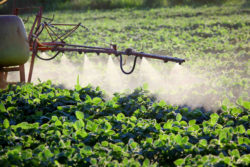Top Class Actions’s website and social media posts use affiliate links. If you make a purchase using such links, we may receive a commission, but it will not result in any additional charges to you. Please review our Affiliate Link Disclosure for more information.

The manufacturer Monsanto, now owned by Bayer AG, continues to defend the product. However, scientific evidence of glyphosate carcinogenicity continues to mount.
In August, 2018, a former groundskeeper in California dying from NHL was awarded $289 million in the first Roundup lawsuit to come to trial. In March, 2019, Bayer was dealt another blow when a California jury awarded another plaintiff $80.3 million after what U.S. District Judge Vincent Chhabria called a “bellwether case.” This does not bode well for the corporate defendant, which faces more than 11,000 more lawsuits over the herbicide.
What is Glyphosate?
Known in scientific terms as n-phosphonomethyl glycine, glyphosate is a broad spectrum herbicide first developed in the early 1970s. By 2016, it had become the second most commonly-used herbicide in the world.
This chemical works by disrupting what is known as the “Shikimate pathway,” a biological mechanism found in cells involved in the formation of amino acids, the basic building blocks of life itself. Unfortunately, once glyphosate enters the food chain, it remains, passing into the bodies of humans and animals. Once there, scientists believe it has a negative effect on beneficial gut flora that is important to the body’s defenses.
The Evidence
Numerous studies over the past two decades have have found strong and convincing scientific evidence linking the use of glyphosate-containing herbicide (GCH) with cancer. These have appeared in the medical journals that include Cancer Epidemiology, Biomarkers and Prevention (2001), Occupational and Environmental Medicine (2003) and the International Journal of Cancer (2008). In 2015, the World Health Organization’s International Agency for Research on Cancer (IARC) listed the active ingredient in Roundup as a “probable carcinogen.”
Was There a Coverup?
Interestingly, the U.S. Environmental Protection Agency (EPA) listed GCHs as a carcinogen in 1985, but reversed its position six years later. An investigation published by The Ecologist revealed that Monsanto was aware of GCH carcinogenicity as early as 1981. Several studies carried out in the 1980s demonstrated that glyphosate could indeed cause the formation of tumors, which were found in EPA archives. However, these reports were never made available to the public.
There is also reportedly evidence of collusion between the EPA and Monsanto. In 2017, the New York Times revealed that the EPA allowed Monsanto to “ghostwrite” its own “research” designed to convince the public that GCHs were harmless to humans.
Local Communities Take Action
As it has become painfully apparent that the EPA and the current federal government has prostituted itself to industry, people at the municipal, county and state level are taking matters into their own hands to ban the use of Roundup. New York City is now calling for a ban on Roundup in city parks, as has smaller communities such as Naperville, Ill. Los Angeles County recently ordered a moratorium on the use of the weed killer.
If you have taken ill after using Roundup, you may be eligible to file a complaint against Bayer; a lawyer experienced in product liability and environmental law can assist you in this undertaking.
If you or a loved one developed cancer after using Roundup as a farm worker or home gardener, you may have a legal claim. Legal migrant farm workers may also seek help. Learn more by filling out the form on this page for a FREE case evaluation.
ATTORNEY ADVERTISING
Top Class Actions is a Proud Member of the American Bar Association
LEGAL INFORMATION IS NOT LEGAL ADVICE
Top Class Actions Legal Statement
©2008 – 2024 Top Class Actions® LLC
Various Trademarks held by their respective owners
This website is not intended for viewing or usage by European Union citizens.
Get Help – It’s Free
Join a Free Roundup Cancer Class Action Lawsuit Investigation
For the most up-to-date information on this case, click here.












